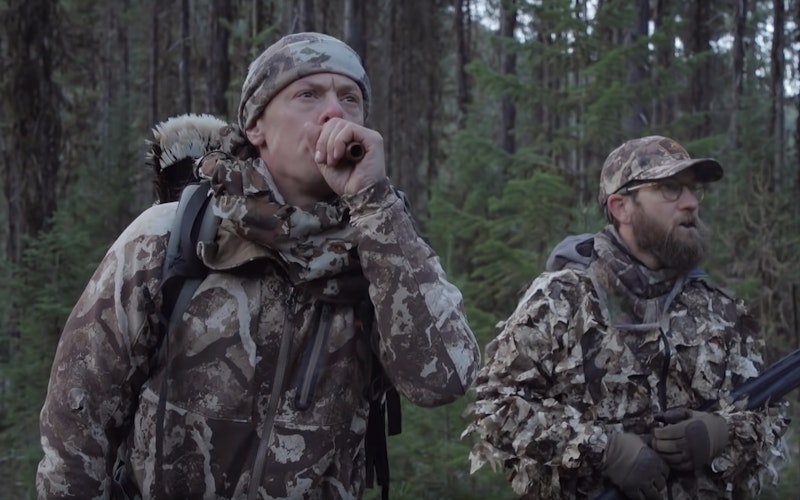
TV
MeatEater and the Cultural Mandate
Some words—such as “stewardship”—aren’t heard much outside of Christian circles. So imagine my surprise when I heard it used regularly in MeatEater, a Netflix show about big-game hunting.
I am fully aware of the controversy around hunting, particularly big-game hunting. The caricature of the bloodthirsty sport hunter, devoid of self-awareness, killing an animal for bragging rights and the adrenaline rush, has been well-documented and, in many cases, is well-deserved. But MeatEater, hosted by conservationist hunter Steve Rinella, unveils a different narrative. Throughout all 10 seasons (the first six are available on MeatEater’s YouTube channel), “stewardship” is the word of the day.
This resonated with my own interest in hunting. I went to seminary in West Michigan and one of my goals was to try hunting for the first time (unfortunately I never managed to make that happen). My interest in hunting arose from reading Eugene Peterson’s memoir, The Pastor. Having grown up as a butcher’s son, Peterson was able to discern the cost of getting meat on his dinner table: the butcher’s work and, of course, the animal’s ultimate sacrifice. The process of having some sort of meat for supper was messy and it did not come cheap. The only connection I had with the food I ate was through the sanitized world that existed on the other side of the plastic drapes of the supermarket deli. I wouldn’t even touch a pack of ground beef without first placing it inside a plastic bag. Unfortunately, this is the norm for many of us, resulting in an incomplete understanding of biblical stewardship. MeatEater hopes to “buck” that trend. (Sorry, I had to do it.)
To understand biblical stewardship, we must have a robust understanding of the creation story. In Genesis 1:28, God gives humankind a mandate of stewardship: “Be fruitful and increase in number; fill the earth and subdue it. Rule over the fish in the sea and the birds in the sky and over every living creature that moves on the ground.” Human beings were meant to have dominion over creation in such a way as to promote flourishing and shalom. How does a show about hunting promote shalom and the flourishing of life? Enter the conservationist hunter. It is here, at the intersection of entertainment and creation care, where MeatEater captures the attention of the Christian viewer.
The only connection I had with the food I ate was through the sanitized world that existed on the other side of the plastic drapes of the supermarket deli.
Rinella’s commentary provides tangible applications for what creation care and stewardship look like. In the third episode of Season 10, Rinella hunts for South Carolina wild turkeys with his guest, Robert Abernathy. Abernathy is a retired biologist who spent his career with the National Wild Turkey Federation and the Longleaf Alliance, both organizations whose respective missions are to promote sustainable ecosystems. In the middle of the episode, Rinella informs us that early in the United States’ history turkey populations were in the untold millions, but then “rampant deforestation and unregulated hunting in the late 1800s reduced [the wild turkey population] to just under 30,000 living in the remotest corners of just 19 states.” However, because of the work of hunters like Abernathy and groups like the National Wild Turkey Foundation, the trend has been reversed. Partnerships with local and national conservation and environmental groups have promoted both the advocacy and the preservation of wildlife management, via restrictive hunting regulations and seed programs that have reintroduced natural vegetation to decimated turkey ecosystems. The results have been more than conclusive. The estimated number of wild turkeys in the United States is now over seven million, spanning 49 states.
Abernathy is not the caricature of the irresponsible hunter some may have in mind. Instead, MeatEater shows conservationist hunters as real-life ambassadors of Christian stewardship by highlighting the responsibility of dominion we have over all of God’s creatures.
Meat doesn’t magically appear on our grocery shelves. MeatEater connects the audience to the entire process by which their meat is brought to the table: from the spot, to the stalk, to the shot, to the harvest, to the cook, to the table. Every show ends with Rinella creating a delicious meal out of the catch or kill. To be able to see this entire process gives the viewer a greater sense of satisfaction, as if we get to experience the payoff of the moment alongside Rinella and his guests. In earlier seasons, Rinella has dedicated entire episodes to the preparation and the cooking of wild game meat; the ossobuco he makes with deer shanks is on my foodie bucket list. If you eat meat, MeatEater will impress upon you a basic responsibility to respect the entire sacrificial process that goes into providing a meal. Rinella advocates for hunting in a way that is as sustainable as it is salivating.
According to the show’s YouTube channel, MeatEater was “founded with the belief that a deeper understanding of the natural world enriches all of our lives.” I believe this is a reflection of Genesis 1:28. With a format that is part nature show and part cooking show, sprinkled with nuance and introspection, MeatEater offers a thoughtful, even prayerful, half hour of entertainment.
Topics: TV